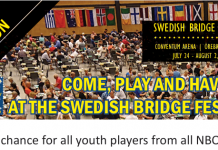A negative double replaces the penalty double in many sequences and becomes a takeout for the unbid suits, particularly the unbid major or majors.
WHAT IS IT?
A double made by you after partner has opened the bidding and right-hand opponent (RHO) has overcalled is for take out. A negative double replaces the penalty double in many sequences and becomes a takeout for the unbid suits, particularly the unbid major or majors. For example:
| North |
East |
South |
West |
1 |
1 |
Double |
|
|
|
|
|
Not using negative doubles, South’s double would be for penalties, showing length and strength in spades. Playing negative doubles, South’s double is for takeout, usually promising at least four hearts.
Why doesn’t South just bid 2

? First, a two level response in hearts guarantees a five card suit, and second, South may not be strong enough to go to the two level, but may not wish to be shut out completely. South might hold:
 6 2
6 2  K J 10 9
K J 10 9  K Q 9 4
K Q 9 4  9 8 3
9 8 3
Remember, particularly, playing five card majors, there is a good possibility that North has four hearts and only three clubs.
WHERE DID IT COME FROM?
I first introduced the negative double in 1957 in my book Bridge is a Partnership Game. Originally called “Sputnik”, this bid was an integral part of the Roth-Stone system. That term “negative” came into use in describing this double to distinguish it from the “positive” or penalty double of an overcall.
WHY IT IS USED?
A primary reason for the negative double is to discover a four-four major suit fit after RHO has intervened. As will be shown later, the negative double may also be used to show a one-suited hand, a limit raise of partner’s opening bid with only three-card support, or general strength.
HOW HIGH ARE THEY PLAYED?
This question was once asked of me and I responded “7

“. My point was that the negative double is not a rigid bid as is the positive (or penalty) double; rather it is an informatory bid with different connotations dependent on the level at which it is used. Although some players use negative doubles exclusively over 1

and/or 2

overcalls of a minor suit opening (since four-four heart fits are difficult to find in these circumstances), most partnerships employing negative doubles use them through overcalls of 2

or 3

. For the remainder of this pamphlet, it shall be assumed that after partner’s opening one-level bids, doubles of all overcalls through 3

are negative.
WHAT DOES IT SHOW?
In theory, at least, a negative double is a limited bid which, if made over a one-level overcall, promises at least 7 high card points (HCP) and usually four card support for an unbid major. After a two-level overcall, it promises slightly more, about 8-10 HCP. If played at the three level and higher, a negative double shows greater strength.
If the doubler has more than the minimum values necessary for his double, he must come out of the bushes at his next turn. However, the doubler must remember that partner is assuming a moderately weak hand until he hears otherwise.
Lets consider a few auctions and see what a negative double would promise.
A.
|
Opening
|
RHO |
Negative Double Shows |
| 1) |
1 |
1 |
Four card length in each major, no five card major, and 7 or more HCP. |
|
|
|
|
| 2) |
1 / / |
1 |
Exactly four spades, and at least 7 HCP. With 5 or more spades, bid one spade. |
|
|
|
|
| 3) |
1 / / |
1 |
Four or more hearts, and at least 7 HCP. You may have 5, 6, or even 7 hearts but not enough strength to bid 2 directly. directly. |
|
|
|
|
| 4) |
1 |
1 |
Probably four cards in each minor and at least 7 HCP, although you may have either a one-suited hand with insufficient strength to make a 2-over 1 response or a limit heart raise with only 3 trumps. |
|
|
|
|
B.
|
Opening
|
RHO |
Negative Double Shows |
| 1) |
1 /1 /1 |
2 /2 /2 |
At least four cards in the unbid major, and a minimum of 8 or 9 HCP. |
|
|
|
|
| 2) |
1 / / |
2 /2 /2 |
At least four cards in the unbid major, and a minimum of 8 or 9 HCP. |
|
|
|
|
| 3) |
1 |
2 |
Presumably at least four cards in each minor and 8 or more HCP, although as in A (4) you may subsequently show a one-suited hand or a limit raise with only 3 trumps. |
|
|
|
|
| 4) |
1 |
2 |
Presumably at least four cards in each minor and 8 or more HCP, although as in A (4) you may subsequently show a one-suited hand or a limit raise with only 3 trumps. |
|
|
|
|
C.
|
Opening
|
RHO |
Negative Double Shows |
| 1) |
One level opening bid |
3 /3 /3 |
Probably four card support for the unbid major(s) and at least 9 HCP, although it is sometimes necessary to double with general strength on hands that offer no other convenient call. |
|
|
|
|
| 2) |
One level opening bid
|
3 /3 /3 |
Equally likely to show general strength as to be takeout for unbid suits. |
| |
|
|
|
Remember, the higher the level the negative double is made, the more likely it is to be converted for penalties by a pass from opener. If the negative doubler follows up his double by bidding a suit, it is not forcing. He is saying in effect that he has a good 5 or 6-card suit, but was not strong enough to bid the suit directly.
| North |
East |
South |
West |
1 |
1 |
Double |
Pass |
2 |
Pass |
2 |
|
|
|
|
|
South promised four hearts with the double, but now that South has bid the suit he must have at least five hearts. He was not strong enough to bid 2

directly over 1

, so he limited his hand with a negative double and then showed his long suit. South might have:

8 7

A K J 10 7

J 10 7

8 6 3
The only way the negative doubler can force his partner to game is to make a cue-bid at his next opportunity. A single raise promises 8-10; a jump raise, 11-12; a 2NT rebid, 10-12; and a jump in a new suit, although rare, is simply highly invitational.
| North |
East |
South |
West |
1 |
1 |
Double |
Pass |
2 |
Pass |
2 |
|
|
|
|
|
South still has the four hearts that he promised with his negative double but apparently has far more general strength than his partner is expecting. He might hold:

9 4 3

A Q J 7

Q 10 9

K J 4
South did not bid 2

directly over the 1

overcall because it would have promised a five card suit and partner might jump raise to 4

with only three card support. No other bid was convenient or descriptive. So, South doubles to show his four hearts and then cue-bids to reveal his game-going strength.
HOW DOES OPENER RESPOND TO IT?
Opener will either rebid the unbid major, rebid his own suit, rebid no trump, rebid his second suit or cue-bid depending on the strength of his hand as follows:
a. With a minimum hand (12-15 points), rebid whatever s-eems appropriate as cheaply as possible.
b. With a good hand (16-18 points), rebid whatever seems appropriate but jump one level.
c. With a game-forcing hand (19 or more points), either cue-bid or jump to game.
Assume you are North and the bidding has proceeded:
| North |
East |
South |
West |
1 |
1 |
Double |
Pass |
| ? |
|
|
|
|
|
|
|
What do you think North should rebid with each of the following hands?
(1)

K J 10

7 6

A Q 10

K J 4 3 2
(2)

A 5

K Q 10 7

6 3 2

A J 10 4
(3)

3 2

A Q 10 5

K 4

A K 10 4 2
(4)

10 9

A J 3

K 3

A K J 10 9 4
(1) 1NT Very similar to rebidding 1NT over a one level response: 12 to 14 or 15 HCP with at least one spade stopper.
(2) 2

Raising partner’s hearts with a minimum opening.
(3) 3

Inviting game, just as you would if partner responded 1

.
(4) 3

, Showing extra values and inviting game.
HOW DO WE MAKE PENALTY DOUBLES?
You pass twice! That is, you pass the overcall, and you pass when partner re-opens with a double. Note the emphasis on “when”. Partner in re-opening seat over a simple overcall, may decide he had a skimpy opener and pass. He must reopen either by rebidding his own suit, bidding a new suit or no trump, or doubling. The only excuse for passing is when holding substantial length in the opponent’s suit.
For example:
| North |
East |
South |
West |
1 |
2 |
? |
|
|
|
|
|
Assume South holds:

A 10 7

8

K J 10 7 4

Q 10 9 3 . This is a perfect penalty double of 2

. By playing
negative doubles you must not double! When holding good trumps the best bet is usually to pass. Remember, partner is supposed to make every effort to keep the bidding open if his right hand opponent passes. If North is short suited in diamonds, he most likely will double 2

and you can then leave in the double. However if you have enough strength to ensure a game you should bid your game remember your partner may pass.
QUIZ
Try the following problems, but don’t worry if you miss many of them. This quiz is meant to be a learning experience rather than to test you on your knowledge of negative doubles.
Partner opens 1

, RHO overcalls 1

. What do you bid with:
| a |
b |
c |
 9 5 9 5
 A Q 7 2 A Q 7 2
 K 9 6 5 K 9 6 5
 7 6 3 7 6 3
|
 9 7 4 9 7 4
 K 7 6 5 K 7 6 5
 Q 9 7 2 Q 9 7 2
 9 2 9 2 |
 A 9 A 9
 K J 10 9 7 2 K J 10 9 7 2
 9 7 3 9 7 3
 8 5 8 5 |
|
|
|
Partner opens 1

, RHO overcalls 1

. What do you bid with:
| d |
e |
f |
 Q 10 7 6 2 Q 10 7 6 2
 A 9 A 9
 7 3 7 3
 Q 7 5 3 Q 7 5 3
|
 K Q 7 3 K Q 7 3
 K 3 K 3
 A K 7 A K 7
 J 6 5 2 J 6 5 2
|
 A Q 5 A Q 5
 7 3 2 7 3 2
 A 9 5 A 9 5
 J 9 5 4 J 9 5 4
|
|
|
|
Partner opens 1

, RHO overcalls 2

. What do you bid with:
| g |
h |
i |
J |
 Q 9 5 3 2 Q 9 5 3 2
 K 5 3 K 5 3
 5 4 3 5 4 3
 K 7 K 7
|
 9 7 6 9 7 6
 K 3 K 3
 K 10 9 7 3 K 10 9 7 3
 A 9 8 A 9 8
|
 K Q 7 6 5 K Q 7 6 5
 Q 8 Q 8
 3 2 3 2
 A Q 7 6 A Q 7 6
|
 J 7 6 3 2 J 7 6 3 2
 9 9
 K J 5 K J 5
 K Q 7 6 5 K Q 7 6 5
|
|
|
|
|
Partner opens 1

RHO overcalls 3

. What do you bid with:
| k |
l |
m |
 K 7 6 K 7 6
 A 7 6 A 7 6
 K 6 5 4 3 K 6 5 4 3
 9 6 9 6
|
 A 9 A 9
 K Q J 10 5 3 K Q J 10 5 3
 9 5 3 9 5 3
 7 6 7 6
|
 Q 7 Q 7
 K Q 4 K Q 4
 K 6 5 K 6 5
 K 7 6 4 2 K 7 6 4 2
|
|
|
|
You open 1

, LHO overcalls 1

partner makes a negative double, and RHO passes. What do you bid with:
| n |
o |
p |
 K J 8 K J 8
 K Q 5 K Q 5
 K Q 7 6 K Q 7 6
 6 3 2 6 3 2
|
 K Q 8 7 K Q 8 7
 K 3 K 3
 A Q 9 7 A Q 9 7
 8 6 4 8 6 4
|
 A Q 7 6 A Q 7 6
 7 6 7 6
 A K Q 7 3 2 A K Q 7 3 2
 9 9
|
|
|
|
| q |
r |
s |
 K Q 9 8 K Q 9 8
 K 3 K 3
 A K Q 6 4 2 A K Q 6 4 2
 3 3 |
 9 8 9 8
 A Q A Q
 A K Q 9 7 5 3 A K Q 9 7 5 3
 K 3 K 3
|
 J 9 7 J 9 7
 3 3
 A K 7 6 3 A K 7 6 3
 K Q 9 7 K Q 9 7
|
|
|
|
| t |
|
|
 A Q J A Q J
 9 7 9 7
 7 6 5 3 2 7 6 5 3 2
 A Q 7 A Q 7
|
|
|
|
|
|
You open 1

, LHO overcalls 2

, and both partner and RHO Pass. What do you bid with:
| u |
v |
w |
 K 9 7 K 9 7
 A K 7 5 3 A K 7 5 3
 8 8
 A K 7 5 A K 7 5
|
 7 7
 K Q J 8 3 2 K Q J 8 3 2
 7 5 7 5
 A J 7 5 A J 7 5
|
 A 8 A 8
 A Q 10 3 2 A Q 10 3 2
 7 7
 K Q J 3 2 K Q J 3 2
|
|
|
|
| x |
y |
z |
 9 3 9 3
 A Q 7 3 2 A Q 7 3 2
 K J 7 5 K J 7 5
 K 9 K 9
|
 K 9 7 K 9 7
 A J 6 5 3 A J 6 5 3
 Q 8 Q 8
 K 9 7 K 9 7
|
 A 8 A 8
 K Q J 10 8 7 3 K Q J 10 8 7 3
 A Q A Q
 K 3 K 3
|
|
|
|
ANSWERS:
a. Double: A “picture-book” negative double.
b. Pass: Not enough strength to double.
c. Double: Not enough strength to bid 2

directly, so double and bid hearts as cheaply as possible over partner’s rebid.
d. 1 :
: Rarely double 1

negatively with 5 spades.
e. Double: No upper limit to negative Double.
f. Double: A rare exception. Although you do not have four spades, it will be impossible to show your strength if you pass and partner reopens with a double.
g. 2 :
: You have enough to double negatively, but if LHO raises to 3

or if partner rebids 3

you will be in an awkward position if you have used a negative double. A simple raise will solve all future problems.
h. Pass: Hope your partner re-opens with a double.
i. 2 :
: What else?
j. Double: Although you might stretch to a 2

call, this leaves you awkwardly placed if partner rebids 3

. After a negative double, you can rebid NT as cheaply as possible over partner’s heart rebid or raise a black suit if he bids one.
k. Double: Too good to pass. You will convert 3

to 3

showing a limit spade raise with 3-card support.
l. Double: Pass partner’s 3

rebid; bid hearts as cheaply as possible over any other call. Too risky to pass since the higher the interference, the more likely partner is to pass in the re-opening seat. You have too many losers for an immediate bid of 3

.
m. Double: Again, too risky to pass. Over 3

or 3

you will try 3NT.
n. 1NT: Minimum hand, minimum no trump rebid.
o. 1
: What else?
p. 2 or 3
or 3 :
: Our preference is for 3

since we will make game opposite as little as K J 9 8 of spades.
q. 2
: Might make slam opposite any two aces.
r. 3NT : Tends to show a running suit since you didn’t open or rebid 2NT.
s. 2 :
: Your second suit.
t. 1 :
: One of the rare times you will rebid in the major partner shows with only three. Much better than rebidding your terrible diamond suit or bidding no trump without a stopper in the enemy suit.
u. Double: Perfect hand for re-opening double. If partner has a diamond stack you should get rich.
v. 2
: No other possibility.
w. Double: Although 3

, may seem attractive, we can bid it if partner bids 2

. But we have a good hand and lots
of defense, and shouldn’t let the opponents escape if partner has diamonds.
x. Pass : Our diamond holding makes it obvious that partner doesn’t have diamonds and his failure to bid anything else makes it likely that defending against 2

is our best spot.
y. Double : Even with a minimum opening it is our responsibility to keep the bidding alive.
z. 3NT : Bid what you think you can make.
Don’t forget to follow us @



























